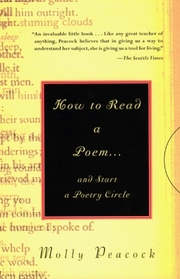Kate L. (KHLS97) reviewed How to Read a Poem. . .: And Start a Poetry Circle on + 22 more book reviews
Although it was only a decade ago that doomsayers foresaw the death of poetry as a viable literary genre, there has been a remarkable resurgence of interest. Poetry slams at bookstores and nightclubs, "Poets in the Schools" programs, and the unprecedented appearance of poets on mainstream television all point to the renewed popularity of the genre. Here are two new guides designed to enrich the experience of poetry. Hirsch (On Love, LJ 6/15/98) has gathered an eclectic group of poems from many times and places, with selections as varied as postwar Polish poetry, works by Keats and Christopher Smart, and lyrics from African American work songs. A prolific, award-winning poet in his own right, Hirsch suggests helpful strategies for understanding and appreciating each poem. The book is scholarly but very readable and incorporates interesting anecdotes from the lives of the poets. Part poetry explication and part memoir, Peacock's charming book includes 18 favorite poems that she has collected and cherished over the years. Offering sensitive interpretations of each work, Peacock tends to favor modern and contemporary poets such as May Swenson, Elizabeth Bishop, and Yusef Komunyakaa. Like Hirsch, Peacock is a popular and critically acclaimed poet; she is also a founder of the "Poetry in Motion" program that puts poetry in America's buses and subways. Peacock encourages the shared enjoyment of poetry through reading groups and provides practical advice for organizing a poetry circle. Most public libraries will want to acquire the Peacock book, while Hirsch is a good choice for academic and larger public libraries.




